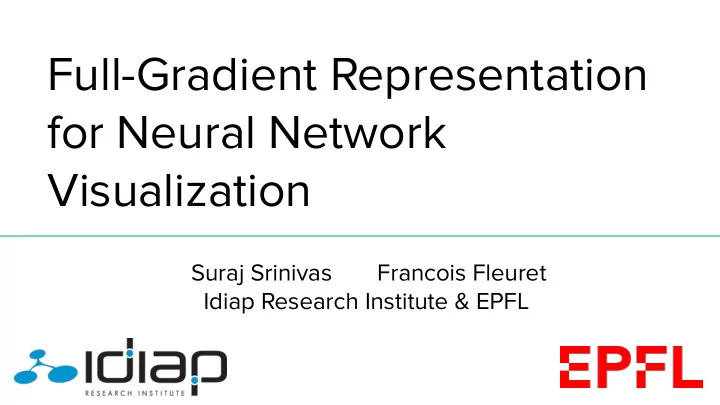

Full-Gradient Representation for Neural Network Visualization Suraj Srinivas Francois Fleuret Idiap Research Institute & EPFL
Why Interpretability for Deep Learning? Why does the model think Deep this chest x-ray shows Pneumonia Neural signs of pneumonia? Network Required for human-in-the-loop decision-making 2
Why Interpretability for Deep Learning? Why does the model think Deep this is a gray whale? Gray Whale Neural Network Required for human engineers to build better models 3
Saliency Maps for Interpretability Highlight important regions Saliency Algorithm Deep Neural Network But what is “importance”? 4
Input-gradients for Saliency Neural network Saliency map - S Input - x - Clear connection to neural network function - Saliency maps can be noisy and ‘uninterpretable’ 5 Simonyan et. al, Deep inside convolutional networks: Visualising image classification models and saliency maps, 2013
Wild West of Saliency Algorithms 1. Input-Gradients 2. Guided Backprop 3. Deconvolution There is no single formal definition 4. Grad-CAM of saliency / feature importance 5. Integrated gradients accepted in the community. 6. DeepLIFT 7. Local Relevance Propagation 8. Deep Taylor Decomposition 6
Two Broad notions of Importance ● Local importance (Weak dependence on inputs) “A pixel is important if slightly changing that pixel, drastically affects model output” Global importance (Completeness with a baseline) ● “All pixels contribute numerically to the model output. The importance of a pixel is the extent of its contribution to the output.” E.g.: output = (contributions of) pixel1 + pixel2 + pixel3 7
The Nature of Importances ?? Still able to recognise bird Sum of importances of pixels in the group ≠ Importance of group of pixels 8 https://pixabay.com/photos/kingfisher-bird-blue-plumage-1905255/
An Impossibility Theorem For any piecewise linear function, it is impossible to obtain a saliency map that satisfies both weak dependence and completeness with a baseline . Why? Saliency maps are not expressive enough to capture the complex non-linear interactions within neural networks. 9 Full-Gradient Representation for Neural Network Visualization, Srinivas & Fleuret, NeurIPS 2019
Full-Gradients 10
Full-Gradients For any neural network 𝒈 (.) the following holds locally: x: input w: weights b: biases Neuron sensitivity Input sensitivity concatenated (Gradients w.r.t. across layers intermediate activations) 11
Neural Network Biases Batch Normalization Non-linearity Local linear approximation y = tanh(x) 12
Properties of Full-gradients ● Satisfies both weak dependence and completeness with a baseline , since full-gradients are more expressive than saliency maps ● Does not suffer from non-attribution due to saturation. Many input-gradient methods provide zero attribution in regions of zero gradient. ● Fully sensitive to changes in underlying function mapping. Some methods (e.g.: guided backprop) do not change their attribution even when some layers are randomized. 13 Adebayo et. al,. Sanity Checks for Saliency Maps, 2018
Full-Gradients for Convolutional Nets bias-gradients of bias-gradients of neurons in layer 1 neurons in layer 2 Naturally incorporates importance of a pixel at multiple receptive fields! 14
FullGrad Aggregation Image Bias-gradients FullGrad Bias-gradients Input-gradients layer 5 Aggregate layer 3 15
FullGrad Saliency Maps Input-gradients Image Grad-CAM FullGrad (Ours) 16
Quantitative Results Pixel perturbation test Remove and Retrain (ROAR) test 17
Conclusion ● We have introduced a new tool called full-gradient representation useful for visualizing neural network responses ● For convolutional nets, FullGrad saliency map naturally captures the importance of a pixel at multiple scales / contexts ● FullGrad better identifies important image pixels than other methods Code: https://github.com/idiap/fullgrad-saliency 18
Thank you 19
Recommend
More recommend